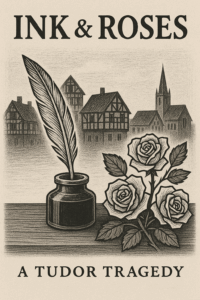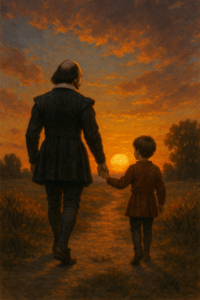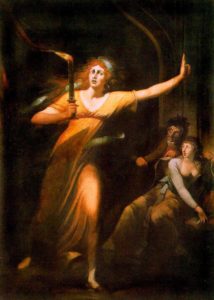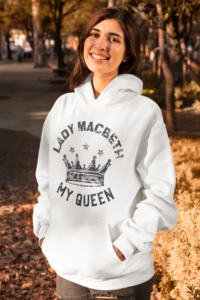(London, 4 May 1592, the small hours)
I. WILL
The air inside the Curtain felt thinner now that the public had been banished. Dust, trapped all day by stomping boots, drifted in slow spirals through a single shaft of moonlight that pierced a cracked casement. Will set his satchel on the stage boards, the buckle’s clink echoing like a dropped coin in a crypt. Somewhere above the rafters a pigeon shifted; wings whispered against ancient beams. He told himself it was only a bird; still, the sound prickled the hairs at his nape.
He had bribed the tire-man with a groat to unlock the playhouse after dark. The key had turned with a reluctant groan, as though the building itself protested against trespass. Now the vast hollow of the yard lay before him, benches ghost-grey under moon-wash, every empty seat an accusation: You promised us stories, and now the city bars its gates.
Will lit a tallow dip and fixed it to the stage-post with its own grease. The flame took, wavered, stretched, throwing long shadows that jittered each time the draught sighed through broken shutters. He drew out the folded sheaf of Richard III and set it down, weighting one corner with the discarded paper crown Ned Alleyn had trodden flat. The crown’s gold paint looked tarnished in the candle-glow, a king reduced to pulp.
He spoke the opening line aloud, softly, as though the words might overhear themselves and refuse the office:
“Now is the winter of our discontent—”
His voice cracked on winter. He cleared his throat, began again, pitching the line into the cavernous dark. It came back hollow, a stranger wearing his own clothes. He pressed on, each syllable a footstep across black ice.
Footfall behind him. The candle-flame guttered violently. Will spun, heart hammering, and found Kit Marlowe instead—coat unbuttoned, breath clouding, a second candle cupped in one gloved hand.
“Keep your voice down,” Kit murmured, “unless you mean to wake every constable in Finsbury.”
II. KIT
He had walked from Bankside along the river’s edge to avoid the watch, boots splashing through shallows where refuse bobbed like tiny corpses. Once he had paused beneath London Bridge, listening to the low growl of water forcing its way through the starlings, and wondered if the Thames itself were rehearsing a tragedy—slow, inevitable, unstoppable.
Now, inside the Curtain, Kit felt the building’s hush press against his eardrums. He liked theatres best when they were empty: the ghost of yesterday’s applause trapped between floorboards, the scent of fresh sawdust mingling with old sweat. Darkness made the place honest—no painted heavens, no gilded gods, only timber, rope, and the threat of ruin.
He set his travelling ink-horn on the prompt-stool, drew a quill already trimmed to a fine point, and a sheaf of cheap paper water-marked with the printer’s anchor. “We write by candle,” he said. “One act before dawn. If the city bars its gates, we’ll raise our own stage inside these walls.”
Will looked dubious; the candle showed the flicker of a man who had nothing left to lose. “What do you want from me?”
“Dialogue. Soldiers who speak like soldiers. And a villain the groundlings can hiss without remembering they’re villains themselves.” Kit tapped the stool. “Sit. Write. I’ll pace.”
III. WILL & KIT
They wrote on. Pages piled like autumn leaves. Candle-smoke curled around their heads, carrying the faint scent of tallow and tallow’s inevitable twin: burning time. Outside, the city slept uneasily; inside, only the scratch of quills and the soft complaint of timber beams disturbed the dark.
At last Kit straightened, rolling cramped shoulders. “Enough. Dawn’s in two hours. If we stay longer the bailiffs will count us among the rats.”

Will set down his quill, flexed ink-black fingers, and noticed that the candle had burned itself into a misshapen stump. Wax had dripped onto the paper crown, sealing king and page together in a translucent shroud. He peeled them apart; the crown tore, leaving a jagged halo.
Kit watched. “Kings break. Paper endures.” He gathered the fresh pages, tapped their edges square, and slipped them inside Will’s satchel. “Keep them safe. Tomorrow we find a printer who doesn’t ask questions.”
Will fastened the buckle. “And if tomorrow never comes?”
Kit’s smile was thin, almost fond. “Then we have already written it. That is more than most men manage.”
They blew out the candles. Darkness swallowed the stage in a single gulp. Side by side, they crossed the yard, boots echoing, and let themselves out into the pre-dawn chill. Behind them, the Curtain stood silent, but the ink was still wet, and somewhere a bell tolled four—counting the hours until the city woke to its own slow undoing.
Next Time: A locked print-shop at dawn, the scent of hot lead, and a single page that could pay two poets’ rent—or buy their silence forever. Chapter 6: “Ink Worth Blood.”
Would you risk everything for a story no one’s allowed to read? Burn the page, or sell it?




